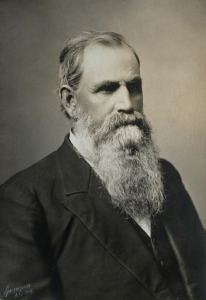
[John Wornall] began farming in Jackson County with comparatively limited means, but through his well directed energies, persistent industry, judicious economy and sterling integrity, he has possessed himself of an ample estate, and worked himself to a place among the foremost financiers and business men of Jackson County.
– “Hon. John B. Wornall: What a Correspondent Says of His Fitness for Governor,” St. Louis Post Dispatch, May 19, 1874
The Wornall family were known for being early pioneers of Kansas City and Westport. John Wornall’s fortunes initially came from farming, but by the late nineteenth century he was largely renting his property to other farmers. He turned to banking, real estate, and politics as new sources of income. He also became involved in philanthropy, particularly for local schools and Baptist churches.
The Wornall Family
The Wornall family – Richard, his wife Judith, and their sons John and Thomas, arrived in the Kansas City area in 1843. Originally from Kentucky, the family was seeking new financial opportunities on the frontier. After taking out a loan of $2,500, the family purchased 500 acres of land from John C. McCoy, settled in a four-room log cabin, and began to farm. The Wornalls farmed oats, corn, hay, and wheat, and raised horses, cows, pigs, and mules. They sold these goods into the town of Westport. The crops from the first year reportedly paid for the entire purchase price of the farm.
Brothers John and Thomas inherited the farm after their mother died and their father returned to Kentucky to remarry. Thomas set out to find his fortune and died of cholera on the Oregon Trail in 1849, leaving John as the sole owner of the farm.
John married Matilda Polk of Kentucky in 1851, and she died the same year.
He remarried to Eliza Johnson in 1854. Eliza was the daughter of Rev. Thomas Johnson, who founded the Shawnee Methodist Indian Mission and would eventually become the namesake of Johnson County, Kansas. John and Eliza had seven children, but only two lived beyond the age of three: Frank (born 1855) and Thomas “T.J.” (born 1865). Eliza passed away a week after the birth of T.J. at 29 years old.
A year later, John married Roma Johnson, Eliza’s first cousin. They had three children, one who was stillborn and two sons: John, Jr. (born 1872) and Charles (born 1876).
John’s Legacy
John played a major role in the early growth of Kansas City. In 1860, the Kansas City Enquirer and Star listed him as one of the “solid men of Jackson County” – someone who paid taxes on $10,000 or more.
Philanthropy & Religion
A firm believer in the power of education, John contributed over $10,000 to the endowment of William Jewell College and served on the board of trustees for 25 years. He was also active in the Baptist Church, serving as moderator of the General Association of Missouri Baptists and raising funds to build Westport Baptist Church.
Politics
In 1870, John was elected to the Missouri State Senate for one term. He served on the Committee on Banks & Corporations and was considered a brilliant public speaker. At the end of his four-year term, he was encouraged to run for governor of Missouri, but he declined, to the dismay of many.
Banking
John served as director for the newly incorporated Kansas City National Bank and acted as president for the remainder of its existence. He later helped organize the Bank of Kansas City.

Roma’s Legacy
After John’s death in 1892, his widow Roma continued to live in the Wornall House for most her life. In 1909, she sold the house and remainder of the original farmstead – about 150 acres – to developer J.C. Nichols, who was developing the upscale Country Club housing district. The house served as the first school building for the Kansas City Country Day School (now The Pembroke Hill School).
Roma repurchased the house in 1911, most likely because utilities finally stretched far enough south to reach the Wornall House. She moved back in and modernized and preserved the house, adding electricity, gas, a garage, and modern plumbing. She was also rumored to be the first woman in Kansas City to own a car. Her granddaughter Roma Virginia Wornall later recalled, “She loved her home and loved to drive her electric car from her home to Westport. She drove her electric until she was 80.”
Roma lived in the Wornall House until her death in 1933. The house was inherited by her son, John Jr., who owned the home until his death in 1962.
Other Residents of the Farmstead
The Wornalls were not the only individuals who lived on the property. Other residents included:
- Unnamed slaves (six in 1850, four 1860-63)
- Harris Manion, an orphan and John’s ward (c. 1859-1861)
- Silas Dawson & Josiah Bassett, laborers (c. 1860)
- Mittie Pigg, an orphan and servant (c. 1862)
- Kiziah Johnson, Roma’s mother (c. 1870)
- Reuben & Walter Johnson, Roma’s brothers (c. 1870)
- Lucilla Johnson, Roma’s sister (c. 1870-1934)
- Fleming Collier, farmer (c. 1870)
- Rose Barnet & Lizzie Wells, servants (c. 1870)
- Louisa Custard, servant and cook (c. 1870)
- Cyrus Cook, servant and farm laborer (c. 1870)
- Unnamed servants (c. 1880-1910)
